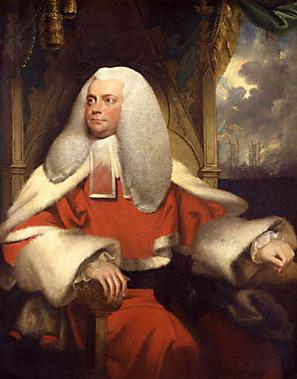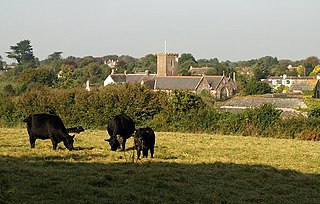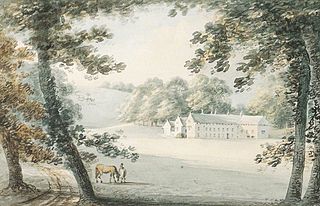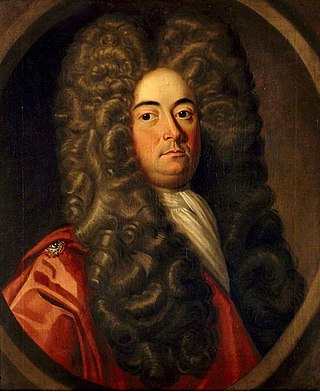
John Fownes (1661-1731) of Kittery Court in the parish of Kingswear and of Nethway in the parish of Brixham, both in Devon, was a British landowner and politician who sat in the House of Commons from 1714 to 1715.

John Fownes (1661-1731) of Kittery Court in the parish of Kingswear and of Nethway in the parish of Brixham, both in Devon, was a British landowner and politician who sat in the House of Commons from 1714 to 1715.
Fownes was the eldest son and heir of John Fownes (1640-1670) of Whitleigh (anciently Whitley) in the parish of St Budeaux, near Plymouth, Devon, by his wife Mary Northleigh (1641-1669), a daughter of Henry Northleigh (1612-1675) [2] [3] of Peamore, Exminster, Devon [4] and sister of Henry Northleigh (1643-1694) [5] of Peamore, thrice MP for Okehampton. His great grandfather was Thomas Fones (died 1638) of Plymouth, Mayor of Plymouth in 1619, who was from Worcestershire and was the first of his family to settle in Devon. [6]

In 1681 Fownes married Anne Yard, [7] a daughter of Edward Yarde (1638-1703) [8] of Churston Court, Churston Ferrers, Devon, MP for Ashburton in 1685, and sister of Edward Yarde (1668/9-1735) of Churston Court, MP for Totnes in 1695. [9] After his marriage, he moved to Kittery Court, a fine house near Dartmouth and became a Freeman of Dartmouth in 1701. [10] Later he purchased the fire damaged Nethway House (and estate) in Kingswear, near Dartmouth from the Hody family and carried out the necessary restoration. [11]
Fownes was a high Tory and was returned as Member of Parliament for Dartmouth at a by-election on 20 March 1714. He did not stand at the 1715 general election when his son was returned as MP for Dartmouth instead. [12]
Fownes died on 4 October 1731 and was buried at Brixham. [4] He had two surviving sons and one surviving daughter. His eldest son was:
Fownes presented to St Mary's Church, Brixham, a 44 ounce silver flagon dated 1704 with a Dublin hallmark. [14] In the Nethway Chapel at the east end of the south aisle of St Mary's Church, Brixham, are buried Thomas Fownes, Vicar 1755-1809, and others of the Fownes family, and several mural monuments to the Fownes and Luttrell families. [15]
Whitleigh is a district area and is in the electoral ward of Budshead of the city of Plymouth in the English county of Devon. It shares district borders with Southway, Honicknowle, Crownhill, West Park and St Budeaux. In the 2001 census the population of Whitleigh was 7,165, of which 48.2% were male and 51.8% were female.

Sir Francis Buller, 1st Baronet was an English judge.

Churston Ferrers is an area and former civil parish, in the borough of Torbay, Devon, England, situated between the south coast towns of Paignton and Brixham. Today it is administered by local government as the Churston-with-Galmpton ward of the Torbay unitary authority. It contains the coastal village of Churston, the now larger village of Galmpton and the Broadsands area.

Lupton is an historic manor in the parish of Brixham, Devon. The surviving manor house known as Lupton House, is a Palladian Country house built by Charles II Hayne (1747–1821), Sheriff of Devon in 1772 and Colonel of the North Devon Militia. It received a Grade II* listing in 1949. The park and gardens are Grade II* listed in the National Register of Historic Parks and Gardens.

Henry Fownes Luttrell, of Dunster Castle, Somerset, was High Sheriff of Somerset from 1754 to 1755 and a Member of Parliament for the borough of Minehead from 1768 to 1774.

Peamore is a historic country estate in the parish of Exminster, Devon, which is near the city of Exeter. In 1810 Peamore House was described as "one of the most pleasant seats in the neighbourhood of Exeter". The house was remodelled in the early 19th century and is now a grade II listed building.

Henry Hippisley Coxe (1748-1795) of Ston Easton Park, Somerset, was MP for Somerset (1792-5).
Matford is an historic estate in the parish of Alphington, near Exeter, Devon. It should not be confused with Matford in the parish of Heavitree, almost immediately opposite on the other side of the River Exe.

Creedy is an historic estate in the parish of Sandford, near Crediton in Devon. It is named from its location on the west side of the River Creedy. It was the seat of the Davie family from about 1600 until the late 20th century. The mansion house on the estate has been called at various times New House, Creedy House, and as presently, Creedy Park. It was first built in about 1600, rebuilt in 1846, burnt down in 1915 and rebuilt 1916–21. It is surrounded by a large park, the boundary of which is enclosed by a stone and brick wall several miles long.

Margaret Fownes-Luttrell was a British heiress, the wife of Henry Fownes Luttrell. She was the heiress of Dunster Castle, under the stipulation in her father's will that her husband should take the additional surname of Luttrell. Four portraits of her exist in Dunster castle and a fifth at Bathealton Court.

Edward Yarde (1669–1735), of Churston Court in the parish of Churston Ferrers in Devon was a Member of Parliament for Totnes in Devon 1695-1698.

Stephen Northleigh (?1692-?1731), of Peamore, Exminster, Devon, was an English politician who sat in the House of Commons from 1713 to 1727.

Sharpham is an historic estate in the parish of Ashprington, Devon. The Georgian mansion house, known as Sharpham House, overlooks the River Dart and is a Grade I listed building. The house was commenced in about 1770 by the Royal Navy captain Philemon Pownoll to the designs of the architect Sir Robert Taylor (1714–1788). In the opinion of Nikolaus Pevsner it contains "one of the most spectacular and daring later 18th century staircase designs anywhere in England". The park and gardens are Grade II* listed in the National Register of Historic Parks and Gardens. Part of the descent of Sharpham is shown on the Palmes family heraldic pedigree roll.

Alexander Luttrell was an English army officer and politician.

Sir William Davie, 4th Baronet (1662–1707) of Creedy in the parish of Sandford, near Crediton in Devon, inherited the Davie baronetcy and the Davie estates from his elder brother Sir John Davie, 3rd Baronet (1660–1692), MP for Saltash 1679–85 and Sheriff of Devon in 1688, who died unmarried at the age of 32.

Painsford is an historic estate in the parish of Ashprington in Devon.

Henry Northleigh (1643–1694) of Peamore in the parish of Exminster in Devon, was thrice MP for Okehampton in Devon.

Thomas Fones of the parish of St Andrew's in the City of Plymouth in Devon, was a merchant who served as Mayor of Plymouth in 1610 and 1619. He was the first of his family to have settled in Devon, and his descendants rose to prominence as members of the Devonshire gentry and as Members of Parliament. In 1746 his great-great-great-grandson Henry Fownes Luttrell (c.1722-1780), High Sheriff of Somerset from 1754 to 1755, and a Member of Parliament for Minehead from 1768 to 1774, married the heiress Margaret Luttrell, and inherited Dunster Castle in Somerset with the extensive Lutterell estates and added his wife's name to his own to comply with the terms of her father's will. He built almshouses near the Great Hill in Plymouth.

John Fownes of Nethway and Kittery Court, near Dartmouth, was a British politician who sat in the House of Commons from 1715 to 1722.

Arthur Champneys of Raleigh House in the parish of Pilton, Devon, and of Love Lane in the City of London, England, was a wealthy merchant and a Member of Parliament for Barnstaple, in Devon, from 1690 to 1705.